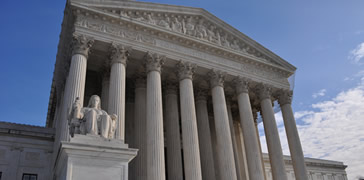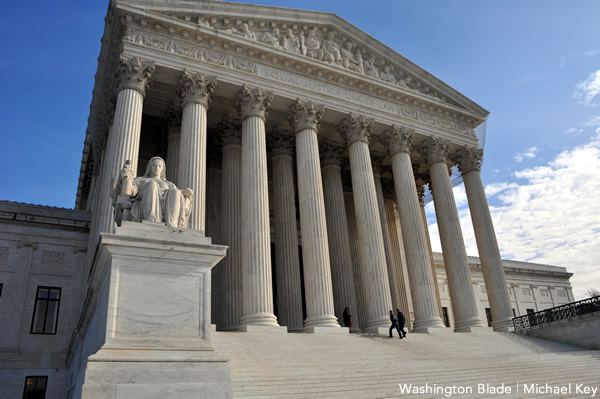National
Supreme Court takes up Prop 8, DOMA cases
Justices to settle two major issues on same-sex marriage


The U.S. Supreme Court took up litigation challenging DOMA and Prop 8 (Washington Blade file photo by Michael Key)
Ending months of anticipation, the U.S. Supreme Court signaled on Friday it would take up litigation challenging California’s Proposition 8 and one case challenging the Defense of Marriage Act.
Justices decided to take up the case of Hollingsworth v. Perry, which seeks to overturn the state constitutional amendment California voters passed in 2008 that took away marriage rights for same-sex couples.
They also decided to take up Windsor v. United States, litigation challenging the constitutionality of the Defense of Marriage Act. That lawsuit was filed by Edith Windsor, a New York widow who was forced to pay $363,000 in estate taxes in 2009 upon the death of her spouse, Thea Spyer.
The court made the news in an orders list published Friday following a conference the justices held on the same day. Four justices must vote affirmatively to grant a writ of certiorari in any particular case, but that vote isn’t public information.
Windsor, 83, expressed excitement in a statement that her lawsuit would be the one to challenge DOMA at the Supreme Court. Her lawsuit was filed by the American Civil Liberties Union along with Paul, Weiss, Rifkind, Wharton & Garrison LLP and other groups.
“When Thea and I met nearly 50 years ago, we never could have dreamed that the story of our life together would be before the Supreme Court as an example of why gay married couples should be treated equally, and not like second-class citizens,” Windsor said. “While Thea is no longer alive, I know how proud she would have been to see this day. The truth is, I never expected any less from my country.”
This news that the court will take up the Perry case is disappointing to many who had hoped justices would decline to hear the litigation and allow a U.S. Ninth Circuit Court of Appeals decision striking down the measure to stand.
John Eastman, chair of the anti-gay National Organization for Marriage, said the decision of the Supreme Court to take up the Prop 8 lawsuit suggests justices are poised to reverse decisions from lower courts against the same-sex marriage ban.
“We believe it is a strong signal that the Court will reverse the lower courts and uphold Proposition 8,” Eastman said. “That is the right outcome based on the law and based on the principle that voters hold the ultimate power over basic policy judgments and their decisions are entitled to respect.”
Still, LGBT advocates expressed excitement that the Supreme Court has decided to take up the Prop 8 case and has the opportunity to rule against California’s same-sex marriage ban once and for all.
Human Rights Campaign President Chad Griffin – who also co-founded the American Foundation for Equal Rights, the organization behind the Prop 8 lawsuit – said the decision marks another “milestone” day for same-sex couples.
“The passage of Proposition 8 caused heartbreak for so many Americans, but today’s announcement gives hope that we will see a landmark Supreme Court ruling for marriage this term,” Griffin said. “As the Court has ruled 14 times in the past, marriage is a fundamental right and I believe they will side with liberty, freedom and equality, moving us toward a more perfect union as they have done in the past.”
The decision means litigation will continue at the Supreme Court and the court will rule on them by the middle of next year. Justices can affirm a Ninth Circuit decision striking down Prop 8 or uphold the anti-gay measure as constitutional. For DOMA, the court could either uphold the federal recognition of same-sex marriage, or strike it down and allow federal benefits to flow to same-sex couples.
No news was made on three other DOMA cases before the Supreme Court: the consolidated case of Gill v. Office of Personnel Management and Massachusetts v. Department of Health & Human Services; Pedersen v. Office of Personnel Management and Golinski v. United States. If justices declined to hear the cases at the Friday conference, it would be announced in another orders list set for publication on Monday.
Doug NeJaime, who’s gay and a professor at Loyola Law School, said justices may have elected to take up the Windsor case — the only DOMA lawsuit in which a federal appeals court ruled against DOMA by applying heightened scrutiny — to apply that same standard to Prop 8.
“If sexual orientation classifications merit heightened scrutiny, as the Second Circuit held, all laws that discriminate against lesbians and gay men – including state marriage prohibitions like Prop. 8 – would be suspect,” NeJaime said.
But NeJaime added taking up both Windsor and Perry may also mean justices see “a material distinction” between a federal law denying recognition to same-sex marriage and a state law preventing same-sex couples from marrying. That could mean the court will split the difference in its rulings, finding DOMA unconstitutional but upholding Prop 8.
In addition to announcing it would take up the litigation, the Supreme Court also asks parties involved in both cases to brief and argue certain questions.
For the Prop 8 case, the parties must answer whether proponents of the same-sex marriage ban have standing under Article III of the U.S. Constitution to defend the same-sex marriage ban in court. Whether anti-gay groups, such as Protect Marriage, have standing to defend the law in court has been a long-standing issue in the case. California Gov. Jerry Brown and California Attorney General Kamala Harris have refused to defend the law in court, leaving anti-gay groups left as the one’s responsible to defend the law.
For the DOMA cases, the court asks parties to answer two questions. The first is whether the executive branch agreement with the U.S. Second Circuit Court of Appeals that DOMA is unconstitutional deprives the Supreme Court of jurisdiction to hear the case. In February 2011, the Obama administration announced that DOMA is unconstitutional and it would no longer defend the law in court.
The second question related to DOMA is whether the House Republican-led Bipartisan Legal Advisory Group has standing to defend the law. After the Obama administration announced it would no longer defend DOMA, House Republicans under the leadership of Speaker John Boehner (R-Ohio) decided to take up defense of the law in the administration’s stead.
The Supreme Court has continually put off making a decision on whether to take up the Prop 8 and DOMA litigation. The cases were first docketed for the conference on Sept. 24, but made no decision at that time. The cases were then docketed for the Nov. 20 conference, but then rescheduled for Nov. 30. No decision was made at that later date. For the recent conference on Nov. 30, it was speculated justices put off making a decision because they needed to more time to decide which combination of the four DOMA cases it wanted to take up.
The next step in the process is for the petitioner — or the party that made an appeal to the Supreme Court — to file opening briefs. Generally, the deadline to do this is 45 days after the court has decided to take up a case. Opposing parties have 30 days to respond, and the petitioner has another 30 days to respond to that. Others parties during this time may also file friend-of-the-court briefs before the court.
Oral arguments will be scheduled by the clerk’s office and likely be announced next week. They’re expected to take place in late Winter or Spring of next year. The court must render a decision before its term ends in June.
No news was also made in another LGBT-related case before the Supreme Court related to Arizona domestic partner benefits. Gov. Jan Brewer appealed to court an injunction barring her from enforcing a law taking away benefits Arizona state employees with same-sex partners. As with the other DOMA cases, if justices have declined to hear the case at the Friday conference, their decision would be announced in another orders list on Monday.
U.S. Supreme Court
Concern over marriage equality in US grows two decades after first Mass. same-sex weddings
Gay and lesbian couples began to marry in Bay State in 2004

Two decades after Massachusetts became the first state to legalize same-sex marriage, a new study reveals both significant progress and ongoing challenges for married LGBTQ couples in the U.S., with a growing sense of insecurity about the future of their rights.
The Williams Institute at UCLA School of Law surveyed 484 married same-sex couples from all 50 states and D.C. The study, released Monday, marks the 20th anniversary of legal same-sex marriage in the U.S.
Researchers found that 93 percent of respondents cited love as a primary reason for marrying, with 75 percent also mentioning legal protections. Over 83 percent reported positive changes in their sense of security, and 74.6 percent noted improved life satisfaction since marrying.
However, the study also highlighted persistent discrimination and growing concerns about the future. About 11 percent of couples who had a wedding reported facing prejudice during the planning process.
Alarmingly, nearly 80 percent of respondents expressed concern about the potential overturning of the 2015 Obergefell v. Hodges decision, which legalized same-sex marriage nationwide. This anxiety has been exacerbated by initiatives like Project 2025, a conservative policy blueprint that some fear could roll back LGBTQ rights if implemented.
The possibility of a former President Donald Trump victory in the upcoming election has further intensified these concerns. Many respondents cited Trump’s previous U.S. Supreme Court appointments and his statements on LGBTQ issues as reasons for their apprehension. One participant stated, “The thought of another Trump presidency keeps me up at night. We’ve come so far, but it feels like our rights could be stripped away at any moment.”
The current political climate has 29 percent of respondents considering moving to another state, with 52.9 percent citing socio-political concerns as a primary reason. This reflects a growing sense of insecurity among LGBTQ couples about their rights and freedoms.
Brad Sears, founding executive director of the Williams Institute, noted, “The data clearly show that marriage equality has had a profound positive impact on same-sex couples and their families. However, it also reveals ongoing challenges and serious concerns about the future of these rights in light of current political trends and the upcoming election.”
Christy Mallory, legal director at the Williams Institute and lead author of the study, added, “This research provides crucial insights into the lived experiences of same-sex couples two decades after marriage equality began in the U.S. The high level of concern about potential loss of rights underscores the continued importance of legal protections and public support for LGBTQ+ equality.”
The study found that 30 percent of surveyed couples have children, with 58.1 percent of those parents reporting that marriage provided more stability for their families. However, many of these families now worry about the security of their legal status in the face of potential policy changes and shifting political landscapes.
As the nation reflects on two decades of marriage equality, the study underscores both the transformative power of legal recognition and the ongoing need for vigilance in protecting LGBTQ+ rights. The findings highlight the complex reality faced by same-sex couples in America today: Celebrating hard-won progress while grappling with uncertainty about the future, particularly in light of upcoming political events and potential shifts in leadership.
State Department
State Department hosts meeting on LGBTQ rights and foreign policy
Event took place before Pride Month reception

Secretary of State Antony Blinken on Thursday hosted a group of LGBTQ activists and politicians from around the world at the State Department.
The event — described as a “Convening on U.S. Foreign Policy: National Security, Inclusive Development, and the Human Rights of LGBTQI+ Persons” — took place before the State Department’s annual Pride Month reception. Participants included:
• Jessica Stern, the special U.S. envoy for the promotion of LGBTQ and intersex rights
• U.S. Ambassador to the U.N. Linda Thomas-Greenfield
• U.S. Trade Representative Katherine Tai
• U.S. Ambassador to India Eric Garcetti
• Suzanne Goldberg, senior advisor to the Under Secretary of State for Civil Security, Democracy, and Human Rights
• Under Secretary of State for Civilian Security, Democracy, and Human Rights Uzra Zeya
• U.S. Agency for International Development Senior LGBTQI+ Coordinator Jay Gilliam
• USAID Counselor Clinton D. White
• National Security Council Senior Director for Democracy and Human Rights Kelly Razzouk
• Assistant U.S. Secretary of Health Adm. Rachel Levine
• National Security Council Human Rights Director Jess Huber
• U.N. Assistant Secretary General for Human Rights Ilze Brandt Kehris
• Icelandic Ambassador to the U.S. Bergdís Ellertsdóttir
• Council for Global Equality Co-Executive Director Mark Bromley
• Outright International Senior Advisor for Global Intersex Rights Kimberly Zieselman
• Essy Adhiambo, executive director of the Institute for Equality and Non Discrimination in Kenya
• Pau González, co-chair of Hombres Trans Panamá and PFLAG-Panamá
“Forty-five years ago, thousands gathered in D.C. in what became the first national march for LGBTQI+, demanding their voices be heard,” said Thomas-Greenfield in a post to her X account that showed her speaking at the event. “We must continue to carry forward the spirit of these pioneers and fight for equal rights and dignity for all.”
Forty-five years ago, thousands gathered in DC in what became the first national march for LGBTQI+, demanding their voices be heard.
We must continue to carry forward the spirit of these pioneers and fight for equal rights and dignity for all. 🏳️🌈🏳️⚧️ pic.twitter.com/oph2Ahmfhq
— Ambassador Linda Thomas-Greenfield (@USAmbUN) June 28, 2024
President Joe Biden in 2021 signed a memo that committed the U.S. to promoting LGBTQ and intersex rights abroad as part of his administration’s overall foreign policy.
“LGBTQI+ rights are human rights,” said Blinken. “Our government has a responsibility to defend them, to promote them — here and everywhere.”
Blinken noted consensual same-sex sexual relations remain criminalized in 64 countries, with the death penalty in 11 of them.
He specifically highlighted Uganda’s Anti-Homosexuality Act and Hungarian Prime Minister Viktor Orbán’s government’s “smearing scapegoating, stigmatizing LGBTQI+ persons — vilifying them with degrading labels, denying them equal rights, normalizing violence against them.” (Gay U.S. Ambassador to Hungary David Pressman this month marched in the annual Budapest Pride parade.)
Blinken noted Iraqi MPs earlier this year “passed legislation that punishes same-sex relations with up to 15 years in prison.” He also pointed out that Indonesian lawmakers approved a new criminal code banning extramarital sex.
“In a nation where same-sex couples cannot marry, these laws effectively make all same-sex conduct illegal and they undermine privacy for all Indonesians,” said Blinken.
“We’re defending and promoting LGBTQI+ rights around the world,” he said.
Blinken noted seven countries — Barbados, St. Kitts and Nevis, Antigua and Barbuda, Dominica, Namibia, Singapore, the Cook Islands — have decriminalized consensual same-sex sexual relations over the last two years. He also highlighted Greece, Liechtenstein, and Thailand this year extended marriage rights to same-sex couples, and other countries are banning so-called “conversion therapy.”
“These achievements are possible because of incredibly courageous human rights defenders and government partners on the ground, but I believe America’s support is indispensable,” said Blinken. “When we engage — sometimes publicly, sometimes privately, sometimes both — when we share our own knowledge and experience, we can and we do achieve change.”
Blinken also announced the U.S. now considers sexual orientation and gender identity are part of the International Covenant on Civil and Political Rights that took effect in 1976.
“This is one of the key treaties committing nations to upholding universal rights,” he said.
“In our regular reporting to the council on human rights, we will continue to include incidents of discrimination or abuse committed against LGBTQI+ persons, now with the clear framework of this well-supported interpretation,” added Blinken. “That will further empower our efforts.”
Blinken reiterated this point and the Biden-Harris administration’s commitment to the promotion of LGBTQ and intersex rights abroad when he spoke at the State Department’s Pride Month event.
“Defending, promoting LGBTQI+ rights globally is the right thing to do, but beyond that, it’s the smart and necessary thing to do for our country, for our national security, for our well-being,” he said.
The White House
Jill and Ashley Biden headline White House Pride celebration
First lady celebrated historic pardons of LGBTQ veterans

First lady Jill Biden and the president and first lady’s daughter, Ashley Biden, headlined the White House Pride celebration on the South Lawn on Wednesday, followed by a performance by singer and actress Deborah Cox.
“My dad has built the most pro-equality administration” in history, Ashley Biden said, crediting the work of LGBTQ people of color like Marsha P. Johnson, a prominent figure in the Stonewall uprising of 1969, as well as “so many of you [who] have continued to lead their fearless fighting against against injustice here and around the world.”
She introduced her mother as “the woman who taught me to be myself up showed me in so many ways how I can make a difference” and who “works every single day, tirelessly, to ensure that all people have the opportunities and freedoms that they deserve.”
“I hope that all of you feel that freedom and love on the South Lawn today,” Jill Biden said.
Her remarks were briefly interrupted by a protestor’s chants of “no Pride in genocide,” which was drowned out by chants of “four more years.”
The first lady noted how many of the attendees came “here from states that are passing laws targeting LGBTQ Americans.”
“There are those who see our communities and our families and wish to tear them down,” she said, “those who can’t see that the world is so much bigger and [more] beautiful than they know — but when our homes are threatened, when they strip away our rights, and deny our basic humanity, we say, ‘not on our watch.'”
“Pride is a celebration, but it is also a declaration,” the first lady said, highlighting the U.S. Supreme Court’s ruling in Obergefell v. Hodges nine years ago, which established marriage equality as the law of the land.
She then credited the accomplishments of the Biden-Harris administration on matters of LGBTQ rights, including the repeal of the previous administration’s ban on military service by transgender servicemembers and the FDA’s loosening of restrictions on blood donation by gay and bisexual men.
The first lady also celebrated the president’s announcement earlier on Wednesday that he will pardon LGBTQ veterans who were discharged and court martialed because of their sexual orientation or gender identity.
“We will never stop fighting for this community,” she said.

-

 Canada1 day ago
Canada1 day agoToronto Pride parade cancelled after pro-Palestinian protesters disrupt it
-

 Theater5 days ago
Theater5 days agoStephen Mark Lukas makes sublime turn in ‘Funny Girl’
-

 Baltimore4 days ago
Baltimore4 days agoDespite record crowds, Baltimore Pride’s LGBTQ critics say organizers dropped the ball
-

 Sports4 days ago
Sports4 days agoHaters troll official Olympics Instagram for celebrating gay athlete and boyfriend










